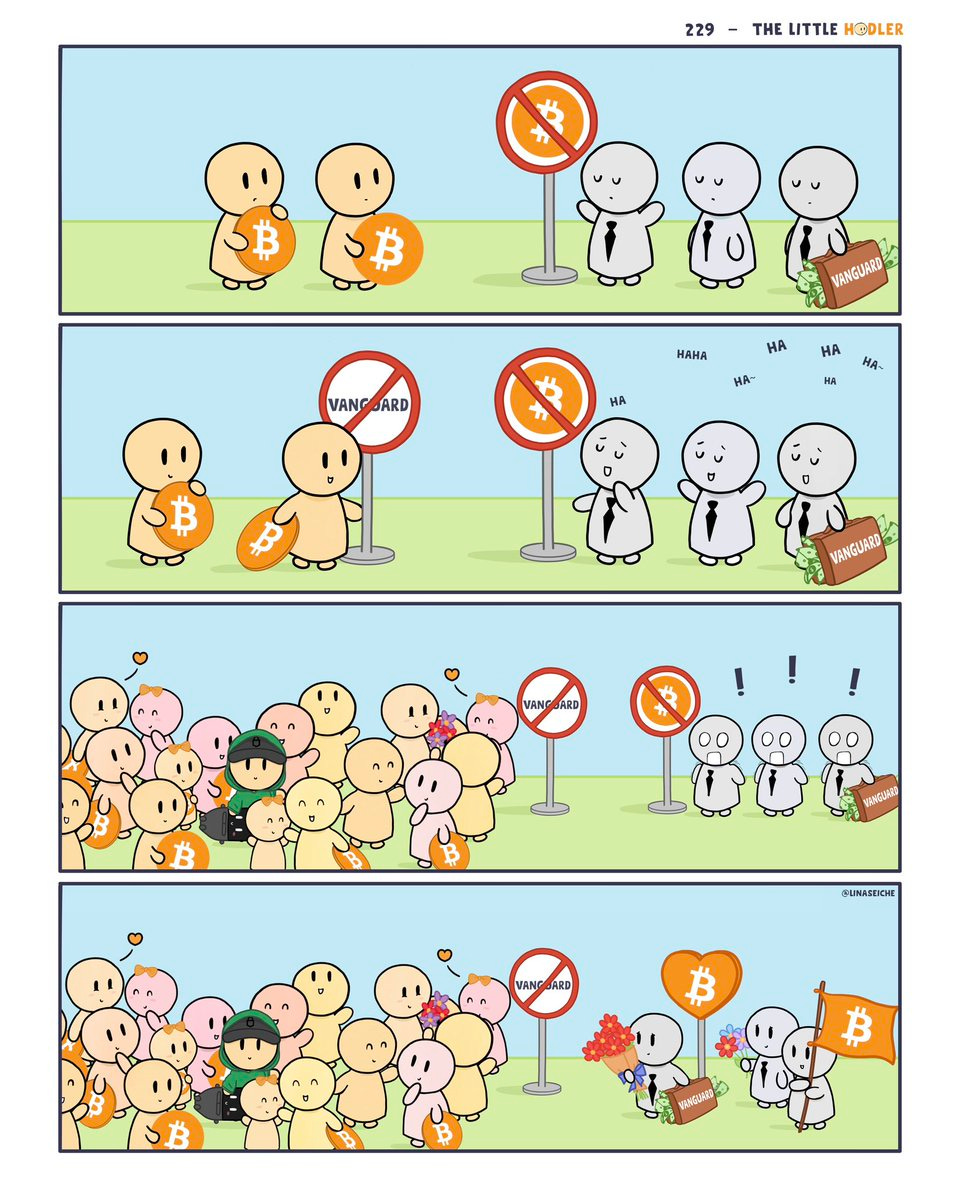Bitcoin Tech Talk #379
Interesting Stuff
Shinzo’s Assassination - This is the story of prime minister Abe Shinzo’s assassin and it is a fascinating read. The story broke all sorts of assumptions about Japan for me and the role of religion in the politics of Japan. I had no idea, for example, that the Unification Church held so much sway in Japan. The stagnancy of the country since the early 90’s makes much more sense in light of some of the revelations in there. No doubt that fiat money has been the reason why Japan sadly has stayed stagnant or in decline, but the role of a corrupt political class combined with some opportunistic cults has really played a number on that society.
The Legacy of Occupy Wall St - This was an amazing analysis of what exactly happened in 2011 and why the movement fizzled soon after. The story we’re generally told is that there were a bunch of people that were on Wall St. for a few months that didn’t really understand what they wanted. As the article points out, the movement was counter-cultural, but like many counter-cultural things, was co-opted. More cynically, the Democratic politicians that were giving lip service to the financial disparity pivoted to BLM and transgender rights, which wouldn’t interfere with the monetary games they were playing. I came away thinking that it’s sad that this energy against the banking system from the left has since dissipated and been completely neutered.
Horrible eBay Case - I did not know a US company could do something this terrible, but essentially, some executives from eBay made one couple’s life hell by sending them live cockroaches and putting fake ads on Craigslist about sex parties at their house. A few of those executives got prison time and the company was fined $3M, but the lengths to which these people went to do something so terrible is astonishing. Just goes to show how fanatical people can be and how “business” is used to justify all manner of horrible behavior.
What I'm up to
Unchained Podcast - I talked on this podcast about Bitcoin Derangement Syndrome, first principles thinking, rent-seeking and fiat money’s corruption of everything. We talked about how stagnant economies have become as a result of fiat money and how a lot of work has become rent seeking. We discussed the incentivization of compliance and the disincentivization of creativity and entrepreneurship and my trip around the world.
Cantillon Effect - This video from Bitcoin Magazine uses an interview I did with them at Bitcoin Conference Amsterdam. Fiat money is horribly destructive for people and nations at the bottom of the Cantillon ladder, but it’s important to note that it’s not good for the people and nations at the top, either. Being a rent-seeker essentially destroys productivity, whether in manufacturing or value added, setting those people and nations up for utter failure once the effect stops.
Adopting Bitcoin Capetown - I will be in South Africa in a couple of weeks for this conference! It’s my first time there and it’ll be a nice relief from the cedar fever of Austin. It’s a bit far, obviously, but I hear it’s beautiful and I look forward to seeing how adoption is going in this part of the world.
Nostr Note of the Week
What I’m Promoting
Unchained Capital is a sponsor of this newsletter. I am an advisor and proud to be a part of a company that’s enhancing security for Bitcoin holders. If you need multisig, collaborative custody or bitcoin native financial services, learn more here.
Bitcoin
BIP39 Debate - There’s some debate going on in the bitcoin-dev mailing list about whether a versioned BIP39 is desirable. The main argument for versioned BIP39 is that you can add different metadata that could be very useful. For example, the wallet birth date, so as to make scanning not take so long. On the other hand, there is the very large ecosystem of current wallets to consider, and it’s unlikely all of them will upgrade to a new standard, even if it’s backwards compatible. I’m not a huge fan of the standard, but it has made backups and restores pretty standard and it’s hard to see this changing.
Cluster Mempool Proposal - You would think that block construction would be more or less simple, with the highest fees getting space ahead of the lower fees. And in a simple, no-dependency mempool, this would be right, but in a world where we have dependency graphs and RBF, this isn’t so simple, and as Suhas Daftuar points out, there are scenarios where RBF makes a cluster of transactions less desirable to include. As such, there’s a new proposal to create a mempool transaction ordering, using clusters which are bounded by vbytes and number of transactions. A total ordering would make block construction much easier and maximized profitability assured.
MercuryLayer - This statechains L2 protocol is live. Like other L2 protocols, you can transfer value off-chain, though, there’s some semi-trust in an entity, which you can revoke by redeeming on-chain. Given the many different L2 discussions that abound, including Liquid, BitVM and Fedi, this one has not really gotten much buzz, but it has a lot of potential. The strength is that large transfers are relatively easy, while the drawback is that precision of how much you pay is a bit tricky.
Lightning
FiatLink - Breez has introduced this standard to enable Lightning/Wallet integrations. The idea is to facilitate Bitcoin to fiat exchange and the mechanism is a standard API by which lightning wallets can access exchanges’ Bitcoin via whatever payment methods. This could be very useful for Bitcoin acquisition, especially in non-KYC exchanges and the different payment methods should in theory make the market more liquid. I would love to see more interoperability of this type, as getting Lightning set up with funds is often the big friction point.
Peerswap Economics - The post goes through moving outbound liquidity to inbound liquidity for the purposes of rebalancing using two different methods, PeerSwap using Liquid and LOOP using on-chain transactions. As the post shows, there’s significantly better economics (1/4th the cost!) for using PeerSwap and Lightning. I’m sure routing nodes will be using tools like this to maximize their revenue and as the post points out, there are ecosystem/network benefits as well. There will appear a lot more options in the future, and I wouldn’t be surprised if there are new ones that will be introduced continuously as we get fee pressure.
Transaction Stacking - Rusty Russell makes the case that as fees increase, there will be a lot more instances of transaction stacking, where you can specify fees later in a single input and change output. Currently, Lightning uses mostly child-pays-for-parent with anchor outputs as a way to specify fees, but as he points out, this is very inefficient from a tx size perspective. A single input and perhaps a change output would be a lot easier. Furthermore, there’s the possibility of combining such transactions as they sign over an input and an output only. As this blog post shows, there’s still some juice to be squeezed on chain to optimize lightning which high fee environments generate.
Economics, Engineering, Etc.
US Spot ETF - It’s is finally out after over 10 years of legal struggle. It was a bit of a disappointing start as there was a little dip in price. The funds seem to have bought Bitcoin in anticipation and there were some bookkeeping reasons for GBTC to sell off. Regardless, this should be a watershed moment as Bitcoin is now mainstream and can be bought at a lot of brokerages, though Vanguard specifically seems to not allow any trading of Bitcoin-related funds.
Freelancer in Kenya - Blink blog has a story of a Kenyan who is getting paid in Bitcoin for SEO expertise. This global human capital optimization is something we’ve been talking about for years in an internet-driven economy, but it’s always been held back by the money. Now that the rails exist with Bitcoin and Lightning, it’s becoming a lot more viable. That said, the true monetary justice, as it were, will only come when fiat money is toppled.
BIP activation - A cynical, but humorous look at BIP activation by the Taproot Wizards group. There’s some truth here, but a lot of what the complaint here is a lack of defined process for getting a soft fork activated. This has been endlessly frustrating for the soft fork advocates that haven’t been successful, such as Jeremy Rubin and Paul Sztorc and it’s very much sympathetic to them. Yet the very lack of a defined process is a good thing. Consensus is not something that stays static, because the constituents are constantly changing. What they’ve produced here is typical of altcoin complaints, that Bitcoin isn’t centralized.
Quick Hits
Bitwise Donations - One of 10 new ETF tickers is pledging 10% of their profits for Bitcoin development.
Bitcoin Treasuries - TenVC argues that Bitcoin companies should be holding way more Bitcoin and gives some tips on how to think about it.
Reversing 6102 - Balaji has a very optimistic take on the ETF, bringing sound money back to the masses.
Altcoiners’ Take on Inscriptions - Interesting overview of Bitcoin-based tokens, essentially, and comparing them to other blockchains. As you might expect, they use Ethereum as the standard and disregard the scams promulgated by such things, but they do have some interesting technical things to say.
Fiat delenda est.








